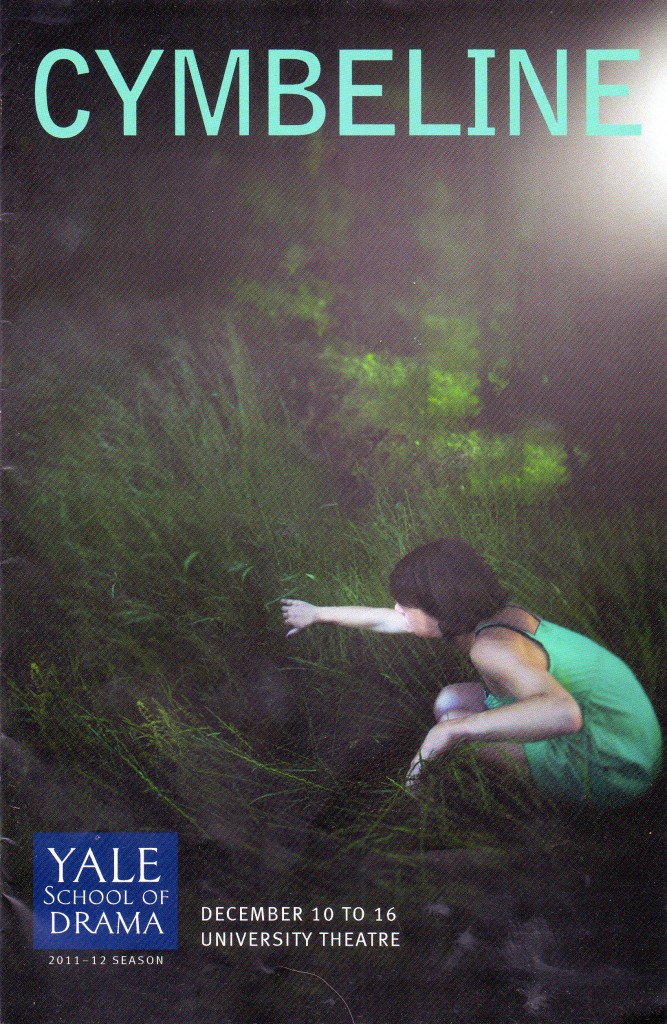Cymbeline
Through December 16 at the Yale University Theatre, 222 York Street, New Haven.
By William Shakespeare. Directed by Louisa Proske. Scenic Designer: Meredith B. Ries. Costume Designer: Nikki Delhomm. Solomon Weisbard. Composer and musician: Michaël Attias. Sound composer: Palmer Heffran. Dramaturg: Kee-Yoon Nahm. Stage Manager: Nicole Marconi. Performed by Adina Verson (Imogen), Fisher Neal (Posthumus), Robert Grant (Cymbeline), Lucas Dixon (Cloten, others), Miriam A. Hyman (The Queen), Michael Place (Pisanio), Paul Pryce (Belarius, others), William DeMeritt (Aviragus, others), Joshua Bermudez (Guiderius, others), Tim Brown (Cornelius, others), Jack Moran (Caius Lucius, others), and Brian Wiles (Iachimo).
You might think that A Winter’s Tale or Twelfth Night might be more appropriate to the time of year, but no, ‘tis the season of Cymbeline. There’s been a big-deal production of Shakespeare’s ungainly tragedy/romance in New York, and now director Louisa Proske has chosen it for her thesis project at the Yale School of Drama.
Despite a ghoulish beheading and an unconscionably cruel attempt to win a bet, the play is not unwelcome in the holiday season. It carries distinct elements of both Winter’s Tale (challenges to a woman’s chastity) and Twelfth Night (deceptive correspondence). It also has a fake-death drug a la Romeo and Juliet and bloodthirsty battles a la most of the other tragedies. A friend just described it to me as “Shakespeare’s greatest hits.”
The biggest question is why the play is named Cymbeline. Yes, he’s the king, and makes the big decisions which bring about closure at the end of the play and avoid a few more needless beheadings. But that’s like titling Twelfth Night after the Duke. Cymbeline is really about Imogen and Postumus and how, by falling out with friends and family, they find much stronger bonds with relatives and friends they didn’t even know about.
On the local front, Cymbeline plays like a continuation of this past summer’s Yale Summer Cabaret Shakespeare Festival. Proske directed As You Like It for that three-show repertory season. Cymbeline is played on a long, shallow black floor (along the unadorned backstage of the Yale University Theatre; the audience sits on bleachers on the actual stage area.) This is not unlike when the semi-arena center-aisle set-up the Cabaret commonly uses. Plus Idina Verson is in this, in drag, as she was in The Tempest and As You Like It over the summer. Verson also had an ingénue-esque turn in this semester’s other director’s thesis project, Lileana Blain-Cruz’s production of Gertrude Stein’s Doctor Faustus Lights the Lights. She’s ideal for such parts, since she’s neither dainty not blunt but can play genuinely androgynous. (Verson was also Ytzak in the Yale Summer Cabaret’s memorable rendition of Hedwig and the Angry Inch a couple summers ago). When called upon to coo or be childlike, Verson comes off as annoying in an entirely appropriate way; she clearly balks at others’ expectations of her.
Cymbeline is one of those Shakespeares that doesn’t get done very often, but not for the usual reasons that some Shakespeares don’t get done very often. It’s not incomprehensible. It’s not dependent on an understanding of British history. It’s not absurdly violent. It’s just not as good as the other Shakespeare plays it resembles. It’s also wonderfully weird in its own special way. There are some stunning quirky one-liners amid the earnest dialogue, such as “I am merrier to die than you are to live” and “Who is it can read a woman?” The moral ends up being “Live, and deal with others better.”
Cymbeline is a loose, crazy script, hard to play straight at times. Director Proske and her game cast totally get this. They utter the lines casually and colloquially, loosening the Shakespearespeak so it matches the modern staging techniques. Silence plays a big role in this show. So does the music score, which alternates between classical pomp and experimental jazz.
The play ends with a string of ridiculous and hokey revelations that have all the finesse of the long explanations at the end of a Murder, She Wrote episode. You may find yourself laughing, but with the cast and not at them—the staging drives home the bard’s desperation to wrap the whole thing up neatly, and the actors seem to be breathing a sigh of relief that the exposition is nearly over. At the same time, individual scenes and characters more than justify the decision to stage this admittedly minor and derivative work. The whole play is an extraordinary blend of slapdash and fascinating.
Stereotypes abound. Cymbeline’s wife, for instance, doesn’t even have a name. She’s just The Queen, in the age-old fairy tale Wicked Queen mold. Miriam A. Hyman, is a bright red gown, plays The Queen’s villainy but gives her a vulnerable, human edge as well. Lucas Dixon goofs amiably as The Queen’s son Cloten, turning a vengeful cretin into a comical upper-class creep. But, with all due respect to Robert Grant’s austere Cymbeline (who sits alone onstage while the audience shuffles in, to the far-away yet nonetheless loud wails of Michael Attias’s mournful post-modern saxophone), the play belongs to Verson’s Imogen and her beloved Posthumus. In that tortured role, Fisher Neal makes the most of the costume designs of Nikki Delhomme, who cloaks this dizzying tragedy in vaguely Edwardian styles that put the play not just in Freudian psychological territory but also give it some neat noir-ish touches.
It’s rare enough to get a chance to see Cymbeline, even given this year’s unexpected glut of productions. It’s especially rare to see one that’s so accessible, so energetic, so youthful and progressive. A derivative drama has become distinguished. It’s as Cymbeline as that.


I don’t ordinarily comment but I gotta admit appreciate it for the post on this perfect one : D.